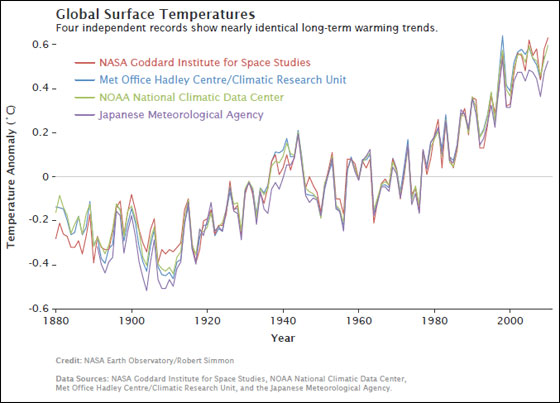 |
|
Multiple groups of scientists have
tracked the rise of temperatures on Earth over time. Working
independently, they end up with results that are largely in agreement
with one another. Prominent physicist and skeptic Richard Muller has
now added his own analysis to the mix, and found that it conforms to
the warming trend seen here. Image courtesy of NASA EarthObservatory/Robert Simmon.
|
Another high-profile skeptic of global
warming has changed his mind.
Physicist Richard Muller announced at
the end of October that his team at the University of California atBerkeley completed an analysis of climate data reaching back over 200
years. Their conclusion? The Earth has warmed about 1 degree
Celsius since 1950. Their findings, which are available online in a
draft paper, confirm what the National Academy of Sciences and other
scientific groups have been saying for years.
Muller's findings are nothing new to
climatologists, and they may not convince the entrenched climate
change deniers who are more interested in ideology than observation.
For the majority of non-expert fence-sitters, though, Muller's work
is extremely important, precisely because it shows the proper role
for skepticism in climate research.
Muller is a respected scientist.
Although his skepticism about the evidence for climate change has
long been used by climate change deniers to bludgeon their opponents,
he was more interested in pursuing the facts. He had worried that
some weather stations (where the raw data on climate is collected)
were more sophisticated or accurate than others. He had worried that
the rise of massive cities in the past century could have skewed some
of the results.
These were legitimate questions for a
scientist to look at. Even though other teams of climatologists
claimed they had accounted for such factors, there is nothing wrong
with replicating research. That is one of the cornerstones of the
scientific method. It's the reason science is more useful than simple
belief: no matter who does the experiment, they will get the same
result.
Muller was prompted to embark on this
study after the 2009 “Climategate” fiasco, in which an
international team of climatologists were accused of changing data to
fit with their understanding that the world was warming.
Investigations into the team's activities by multiple groups,
including the British government, revealed that their data was solid.
Nevertheless, politicians and average people, especially in the
United States, were increasingly convinced that the world might not
be warming. Muller's study puts that scandal to rest.
Deniers still have some wiggle room.
Muller says that he still isn't sure whether or not the planet's
warming is being driven by humans, and his study did not answer that
question.
There will still be plenty of people
who claim that global warming is entirely natural and that human
emissions of carbon dioxide don't matter. It's sad that such a belief
persists despite the fact that scientists have known for centuries
that greenhouse gases change atmospheric temperatures. It was all the
way back in 1896 that Swedish scientist Svante Arrhenius first
pointed out that human emissions of carbon dioxide were warming the
Earth.
Mounds of evidence have built on
Arrhenius's findings over the last hundred years. The basic mechanism
that causes warming has never been contradicted, only refined.
There are still real scientific
questions to pursue. Will warming lead to increased clouds that
offset some of the heat on the ground? Will reservoirs of methane (an
even more potent greenhouse gas) trapped in frozen lakes push warming
past some “point of no return” as the lakes thaw? How much carbon
dioxide can the oceans absorb, and how will that impact sea life?
These problems are being worked on by
scientists now. They may overturn some of our current understanding
of the details, but they won't change the fundamental role of human
emissions.
In the meantime, the rest of us need to
stop fighting about whether or not global warming is real. The whole
time that we've been embroiled in an unproductive ideological battle,
the planet has been changing. We need to start applying skepticism to
the right questions about how we will deal with a reality that does
not care if we believe in it.
No comments:
Post a Comment